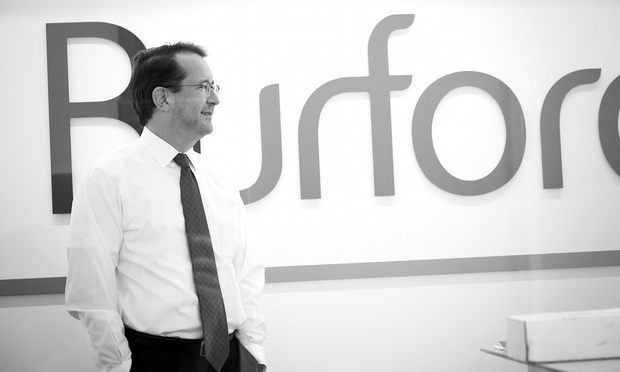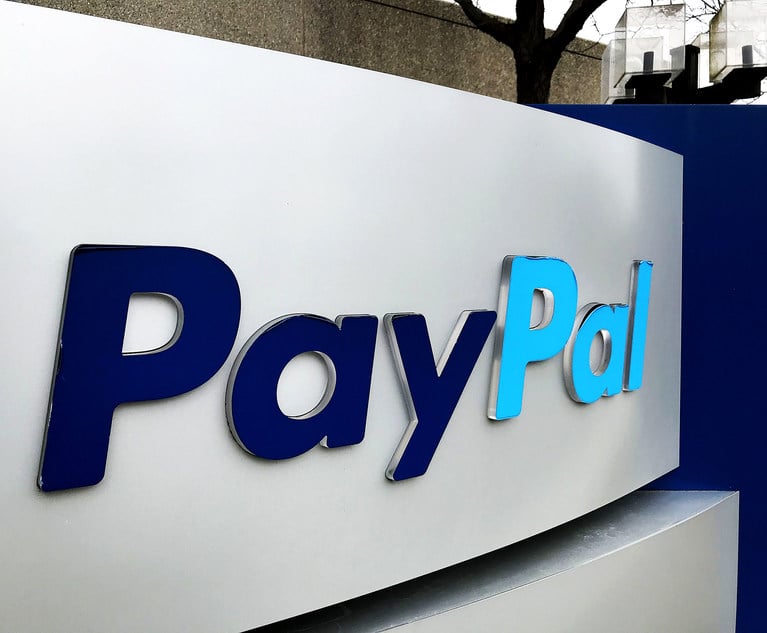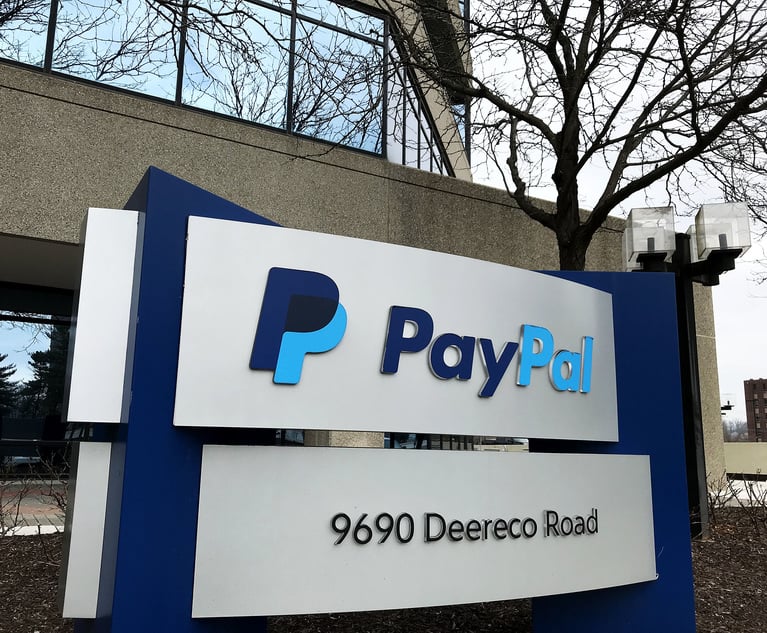Litigation Funders Push Back Against In-House Lawyers' Call for Disclosure
Their message follows a letter by a group of 30 current and former top lawyers at major companies including Google, Verizon Wireless and AT&T Inc., who back a proposed measure that would require full disclosure of third-party funding agreements in civil actions.
February 21, 2019 at 12:49 PM
4 minute read
 Christopher Bogart, CEO of Burford Capital
Christopher Bogart, CEO of Burford Capital
Litigation funders have responded forcefully to a group of in-house lawyers who are asking for more fulsome disclosures of third-party funding in federal litigation.
A group of 30 current and former top lawyers at major companies including Google, Verizon Wireless and AT&T Inc. signed onto a letter last month backing a proposed amendment to Federal Rules of Civil Procedure 26(a)(1)(A) that would require the full disclosure of third-party funding agreements in civil actions.
In response, leaders from three major litigation funders Wednesday fired off their own letter to the committee at the Administrative Office of the United States Courts, which is considering the proposed changes. They call the in-house lawyers' letter ”a PR stunt” by the U.S. Chamber of Commerce's Institute for Legal Reform, which has sought to reign in the litigation finance industry. The in-house counsels' request, the funders wrote, amounts to “a push for forced disclosure of irrelevant information that one party is simply curious to know.”
“The instances in which federal courts have permitted discovery into litigation funding arrangements are exceedingly rare; they arise only under unique circumstances where they are, in fact, germane to the claims and defenses of the parties,” wrote the group of funders—Eric Blinderman, the CEO of Therium Capital Management Ltd. in the U.S., Allison Chock, the chief investment officer of Bentham IMF, and Danielle Cutrona, director, Global Public Policy of Burford Capital. “The call for blanket forced disclosure under Rule 26 flies in the face of these bedrock relevance principles, and thus, should be viewed with great skepticism by the Advisory Committee.”
The courts, they wrote, already have the ability to probe funding arrangements when parties have shown that they are relevant to the underlying dispute. They point out that U.S. District Judge Dan Polster of the Northern District of Ohio, who is overseeing the multidistrict litigation against opioid makers, has ordered counsel in that case to submit descriptions of any third-party funding for in camera review, and declarations that funding hasn't created conflicts. The litigation funders labelled it “blatant hypocrisy” that the Chamber would call for the disclosure of private transactions while protecting the privacy of its own donor list.
Writing separately, Burford CEO Christopher Bogart claimed that 90 percent of Am Law 100 law firms and major companies, including signatories to last month's letter, are Burford clients. One company that signed on to the letter, he wrote, had approached Burford about litigation funding in the weeks since the in-house counsel sent their letter.
“Why, then, the apparent dissonance of corporate counsel signing the Chamber's letter while also using our capital?” Bogart wrote. “The simple answer is the bare-knuckled tactics of the Chamber, not merely in its political lobbying, but also in managing its members, for whom it is easier to sign on publicly rather than to refuse to go with the flow.”
The letters come just a week after group of Republican U.S. senators reintroduced legislation that would require plaintiffs to disclose when they've secured third-party funding in litigation.
Lisa A. Rickard, the president of the U.S. Chamber Institute for Legal Reform, said in a statement supporting the bill that Congress “sees the dangers that secretive lawsuit funding deals pose to fairness and justice in our courts.”
“It's time for the lucrative business of betting on other peoples' lawsuits to get examined in the light of day, and the Litigation Funding Transparency Act will do just that,” she said.
Read the three funders' letter:
Read Bogart's letter:
Read more:
General Counsel Push for Full Disclosure of Third-Party Litigation Funding in New Letter
What Are People Saying About the Senate's New Lit Funding Bill?
Perspectives From a Litigation Funder: The Case for Sensible Disclosure
This content has been archived. It is available through our partners, LexisNexis® and Bloomberg Law.
To view this content, please continue to their sites.
Not a Lexis Subscriber?
Subscribe Now
Not a Bloomberg Law Subscriber?
Subscribe Now
NOT FOR REPRINT
© 2025 ALM Global, LLC, All Rights Reserved. Request academic re-use from www.copyright.com. All other uses, submit a request to [email protected]. For more information visit Asset & Logo Licensing.
You Might Like
View All
'It's Not Going to Be Pretty': PayPal, Capital One Face Novel Class Actions Over 'Poaching' Commissions Owed Influencers

'Biggest Influencer Scam of All Time'?: PayPal Accused of Poaching Commissions Via Its 'Honey' Browser Extension


Trending Stories
- 15th Circuit Considers Challenge to Louisiana's Ten Commandments Law
- 2Crocs Accused of Padding Revenue With Channel-Stuffing HEYDUDE Shoes
- 3E-discovery Practitioners Are Racing to Adapt to Social Media’s Evolving Landscape
- 4The Law Firm Disrupted: For Office Policies, Big Law Has Its Ear to the Market, Not to Trump
- 5FTC Finalizes Child Online Privacy Rule Updates, But Ferguson Eyes Further Changes
Who Got The Work
J. Brugh Lower of Gibbons has entered an appearance for industrial equipment supplier Devco Corporation in a pending trademark infringement lawsuit. The suit, accusing the defendant of selling knock-off Graco products, was filed Dec. 18 in New Jersey District Court by Rivkin Radler on behalf of Graco Inc. and Graco Minnesota. The case, assigned to U.S. District Judge Zahid N. Quraishi, is 3:24-cv-11294, Graco Inc. et al v. Devco Corporation.
Who Got The Work
Rebecca Maller-Stein and Kent A. Yalowitz of Arnold & Porter Kaye Scholer have entered their appearances for Hanaco Venture Capital and its executives, Lior Prosor and David Frankel, in a pending securities lawsuit. The action, filed on Dec. 24 in New York Southern District Court by Zell, Aron & Co. on behalf of Goldeneye Advisors, accuses the defendants of negligently and fraudulently managing the plaintiff's $1 million investment. The case, assigned to U.S. District Judge Vernon S. Broderick, is 1:24-cv-09918, Goldeneye Advisors, LLC v. Hanaco Venture Capital, Ltd. et al.
Who Got The Work
Attorneys from A&O Shearman has stepped in as defense counsel for Toronto-Dominion Bank and other defendants in a pending securities class action. The suit, filed Dec. 11 in New York Southern District Court by Bleichmar Fonti & Auld, accuses the defendants of concealing the bank's 'pervasive' deficiencies in regards to its compliance with the Bank Secrecy Act and the quality of its anti-money laundering controls. The case, assigned to U.S. District Judge Arun Subramanian, is 1:24-cv-09445, Gonzalez v. The Toronto-Dominion Bank et al.
Who Got The Work
Crown Castle International, a Pennsylvania company providing shared communications infrastructure, has turned to Luke D. Wolf of Gordon Rees Scully Mansukhani to fend off a pending breach-of-contract lawsuit. The court action, filed Nov. 25 in Michigan Eastern District Court by Hooper Hathaway PC on behalf of The Town Residences LLC, accuses Crown Castle of failing to transfer approximately $30,000 in utility payments from T-Mobile in breach of a roof-top lease and assignment agreement. The case, assigned to U.S. District Judge Susan K. Declercq, is 2:24-cv-13131, The Town Residences LLC v. T-Mobile US, Inc. et al.
Who Got The Work
Wilfred P. Coronato and Daniel M. Schwartz of McCarter & English have stepped in as defense counsel to Electrolux Home Products Inc. in a pending product liability lawsuit. The court action, filed Nov. 26 in New York Eastern District Court by Poulos Lopiccolo PC and Nagel Rice LLP on behalf of David Stern, alleges that the defendant's refrigerators’ drawers and shelving repeatedly break and fall apart within months after purchase. The case, assigned to U.S. District Judge Joan M. Azrack, is 2:24-cv-08204, Stern v. Electrolux Home Products, Inc.
Featured Firms
Law Offices of Gary Martin Hays & Associates, P.C.
(470) 294-1674
Law Offices of Mark E. Salomone
(857) 444-6468
Smith & Hassler
(713) 739-1250






